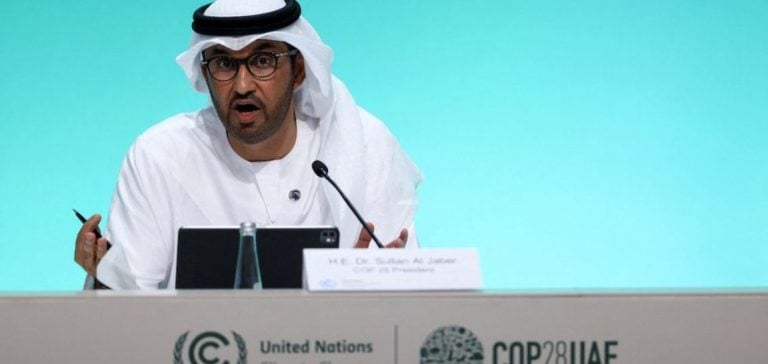Sultan Al Jaber, President of COP28, made a clear call to the world’s governments at a side event to the UN General Assembly in New York.
He urged Parties to accelerate the submission of their next Nationally Determined Contributions (NDCs) before the February 2025 deadline.
This call, already echoed at COP28, is in line with the Emirati consensus for faster and more effective global decarbonization.
Addressing an audience of political and economic decision-makers, Al Jaber reiterated that the NDCs represent much more than a climate framework.
They are genuine catalysts for socio-economic growth, enabling economies to integrate cutting-edge technologies such as artificial intelligence and renewable energies to accelerate the energy transition.
He insisted that countries must perceive these contributions not as a burden, but as a strategic opportunity for growth.
Investing in the energy and technology transition
The development of NDCs must not be limited to symbolic commitments.
Al Jaber highlighted the potential of three major global trends: the energy transition, the rise of artificial intelligence (AI) and the expansion of emerging markets.
In his view, these three pillars will not only accelerate the reduction of greenhouse gas emissions, but also generate opportunities for sustainable growth, particularly in developing economies.
The United Arab Emirates, a pioneer in diversifying its energy sources, is a case in point.
Since 2019, the UAE has doubled its renewable energy capacity and plans to triple it by 2030.
This strategic move is part of their drive to strengthen their energy independence while reducing their carbon footprint.
Al Jaber stressed that decarbonization will not be achieved without the massive integration of technologies such as AI, energy efficiency and innovation in transport systems and infrastructure.
The Oil Sector Decarbonization Charter
At the same time, Al Jaber highlighted the evolution of the Oil and Gas Decarbonization Charter (OGDC), which has grown from 19 members to 54, covering 43% of the world’s oil production.
This figure demonstrates the growing willingness of producing countries to play an active part in reducing their emissions, while preserving their economic interests.
Collaboration with major industry players enables a smoother transition to cleaner solutions, while maintaining global supply chains.
The charter also provides a framework for companies wishing to include their sectors in future NDCs.
Al Jaber emphasized the importance of industry engagement in these plans, stressing that inclusive approaches deliver concrete results.
In this way, OGDC members are demonstrating that it is possible to combine traditional energy production with decarbonization.
Anticipating these initiatives is crucial to maintaining the 1.5°C target, while ensuring a seamless transition for hydrocarbon-dependent economies.
Financing and collective objectives for COP29
Another central aspect addressed by Sultan Al Jaber was the need to reach a financial consensus at COP29.
He stressed the importance of setting a Collective Quantified Target (CQT) for climate financing.
This new financial framework should enable investments to be directed towards the most vulnerable sectors, particularly those in developing countries.
The implementation of this mechanism will ensure a better distribution of funds and reinforce the impact of NDCs.
For decarbonization to be effective, substantial financial resources must be allocated to green technologies and low-emission energy infrastructures.
Without this significant financial contribution, it will be difficult to achieve global climate objectives.
Immediate action to speed up the transition
To reinforce this momentum, Al Jaber announced that the United Arab Emirates will submit its next NDC before COP29, illustrating its commitment to decarbonization.
This contribution will cover all economic sectors, including energy, industry, transport and waste.
The country will put in place a rigorous legal framework to ensure that these targets are met, with precise time milestones for each sector.
In parallel, the COP Presidencies Troika – an unprecedented partnership between the COP presidencies of the United Arab Emirates, Azerbaijan and Brazil – will launch a series of initiatives to stimulate discussion and cooperation around the NDCs.
In particular, Al Jaber cited key events such as the Petersberg Climate Dialogue in Germany and the Ministerial Meeting on Climate Action in Wuhan, China, which will bring together leaders to develop concrete climate strategies.
Sultan Al Jaber reiterated the urgent need for rapid, coordinated collective action.
By submitting ambitious NDCs and investing massively in technology and innovation, governments will not only be able to achieve their climate goals, but also pave the way for sustainable and inclusive economic growth.






















